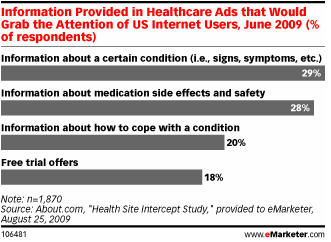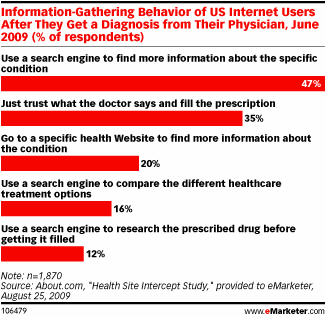When it comes to marketing on the Internet, pharmaceutical marketers need to educate consumers, give them more information, and, of course, get their attention. But can online ads help them achieve these goals? The answer is yes.
According to a recent eMarketer survey about pharma ads, consumers are looking for specific information about conditions, treatment options, signs and symptoms, side effects, and safety. They also seem to be more interested in factual medical data than “free trials” and similar offers.

But are pharmaceutical companies able to accomplish this through online advertising? So far they’re not doing a bad job. More than 4 in 10 Internet users revealed that online ads not only made them aware of treatment options, but also educated them about symptoms and conditions. In fact, 17% felt like they could speak with their doctor about their condition because of pharmaceutical advertising.
Survey Says:
Nearly one-half of Internet users responding to a recent eMarketer survey said they used a search engine to find more data about their specific medical condition. Another 20% went to health websites to get more information, and others used search engines to find out more about treatment options and prescription drugs. Just 35% of internet users simply trusted their doctor without looking to the Web.

But FDA regulations remain rigid. “Our laws for how products that are approved by the agency can be marketed to consumers are the same regardless of the medium, whether they are print ads, radio ads, television ads or Internet ads,” said agency spokeswoman Rita Chappelle in a recent interview. However, a representative of Sanofi-Aventis notes the FDA has not yet issued “specific regulations or guidance for Internet promotion.”
Most pharmaceutical companies seem to by complying:
![]()
But the companies who sell prescription drugs still don’t seem to be concerned, nor are they held to the same regulations:

Others have come up with creative solutions. Google, for instance, is experimenting with what they are calling a “Help Seeking Ad.” This is part of a 1% test in which Latisse is involved. The ad describes the condition, but it doesn’t recommend or suggest a drug, and the URL is replaced with text. This ad is regulated by the FTC, not the FDA, because there is no mention of the brand in their ad copy.
Here’s an example:

The big problem remains: how can pharmaceutical companies develop attention-getting ads that fit all of the information that consumers need into such little space while complying with FDA regulations? We posed a possible solution to this challenge back in May, with our example of a paid search pharma ad that expands to show consumers important safety information. But the medium itself currently does not allow for these types of ads to be developed, and we’re hoping Google and other search engines are paying close attention. Some companies aren’t changing a thing, while others are simply becoming more creative. But so far, there is no single solution.
Comments Off
Web Ad.vantage is a full-service online marketing company with core competencies in search engine optimization, PPC Campaign Management and online media buying. Visit our Internet Marketing Services section to learn more about our full range of services.
WebAdvantage.net encourages the reprinting of our marketing tips and articles. Before doing so, however, please contact us at for permission to do so. The company bio located above is required to accompany any reprint. Thank you in advance for your professional courtesy.
Pragmatic, professional advice with no hidden agenda.

Internet Business Forum






 back to top
back to top






